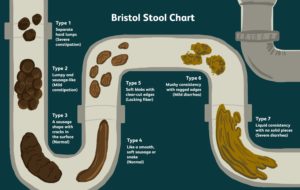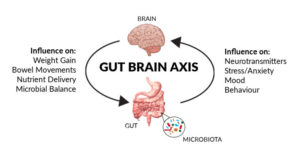
I can see curiosity got the better of you…and I’m very glad. Despite the obviously uncomfortable topic, this is a really important question that I need to answer for you.
In fact, your health depends on this.
Poor gut health reflects into every organ of the body and is responsible for a whole list of disease states.
Your gut bacteria and the integrity of your gut lining strongly affect your health.
According to numerous studies, undesirable bacterial products called endotoxins can sometimes leak through your gut lining and enter your bloodstream.
Your immune system then recognizes these foreign molecules and attacks them – resulting in chronic inflammation.
Many chronic metabolic conditions are caused or influenced by chronic gut inflammation.
What Does Your Poo Say About You?
To fully understand if your poo is unhealthy, we must first know what a healthy bowel movement looks like:
- No cramping, gas, or bloating beforehand
- Easy and comfortable, takes very little time
- No undigested bits and pieces
- No wiping needed, or very little
- Not much smell and even tolerable
- Colour is light to dark brown
- It sinks (no floaters allowed)
- Shaped like a smooth snake or slightly cracked oblong (ideally type 3 or 4 on Bristol Stool Chart – see below)

If your poo isn’t ‘beautiful’ like the ones I describe above, it’s a sign of trouble elsewhere in your body, especially in vital organs such as your liver, gallbladder, pancreas, kidney, heart, sex organs, and even your thyroid.
But, by far the most affected organ that suffers because of poor gut health is your brain.
Research has found that our brain, our gut, and the gut microbes inside communicate with each other – confirming a powerful link between our gut and our brain. In fact, the gut is often referred to as our ‘second brain’.
It has its very own nervous system (the enteric nervous system), and signals can be transmitted in both directions, meaning that our gut can send messages to our brain and our brain can send messages to our gut.

This connection is termed the ‘gut-brain axis’ and it’s why when we feel anxious we can feel sick in the stomach or when we’re nervous we sometimes get butterflies. It’s also why those with IBS (irritable bowel syndrome) may notice that their symptoms worsen when they’re stressed.
Your gut-brain connection or communication suffers tremendously when your bowel motions are not up to speed.
Ugly Poo Is A Sign Your Gut Is Not Working Properly
If you have a less than ideal bowel motion, then we can assume the following:
#1 You can’t absorb the nutrients in your food that are needed for growth and cell repair, and especially hormonal and brain balance. So even if you are eating well and supplementing, it’s not helping.
#2 Your gut can’t produce the neurotransmitters that make you feel good in your body and brain. This includes serotonin (80% gut produced), dopamine, glutamate, noradrenaline, and nitric oxide. This saps your confidence, motivation, joy, and satisfaction in life.
#3 Proteins, pathogens, toxins, and other substances can leak out of your gut, into your bloodstream and activate immune cells. Though their amounts are too small to cause symptoms of an infection like fever, they’re high enough to stimulate chronic inflammation, causing issues over time, such as autoimmune disorders.
They can also cross the blood-brain barrier, creating problems such as depression, anxiety, anger, irritability, and fatigue.
#4 Inflammation in the gut correlates with inflammation in the body creating issues with many organs and even leading to a large array of autoimmune disorders.
Inflammation in the brain particularly leads to memory, poor sleep, more depression, and anxiety. Research has shown chronic inflammation is linked to conditions such as Parkinson’s, Alzheimer’s and dementia.
#5 Your have dysbiosis or microbial imbalance in the gut flora (bacteria, fungi, and protozoa). Good gut flora is essential for digestion and immune functioning. With dysbiosis, the number of helpful microbes becomes less and less able to keep the ‘unfriendly’ microbes from multiplying.
This can result in a change in the location of the various types of microorganisms throughout the intestines or a change in how they are operating. A state of dysbiosis, therefore, will result in many digestive complaints and a multitude of systemic symptoms.
The Bottom Line
Many chronic metabolic diseases are believed to begin in the gut, and long-term inflammation is thought to be a driving force.
It’s likely that the general healthfulness of your diet and lifestyle affects your risk of chronic inflammation and conditions linked to it, rather than a single dietary cause.
Thus, to keep yourself and your gut healthy, it’s best to focus on an overall healthy lifestyle with minimal toxin exposure, plenty of exercise, good sleep, minimal stress, and a diet based on real foods, plenty of fibre, probiotics, and few processed junk foods.
As a quick visual ‘check-up’ for yourself and to get a fairly decent summary of what’s happening within your entire body, please look back at the toilet bowl after all your bowel motions to see just how healthy your poo is .. and ultimately, how healthy you are!
**If you’ve got this far – thank you for reading and I look forward to bringing you more information in the future.
Now, enjoy some much needed inspirational (and humorous) music…
